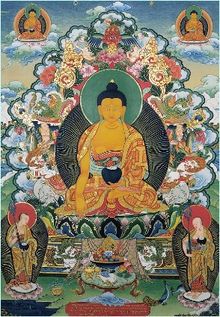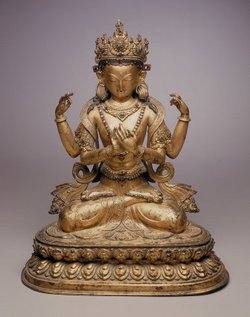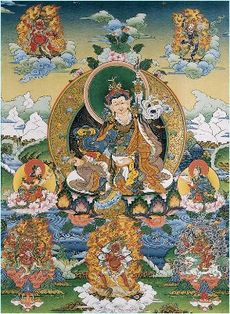The Rangjung Yeshe Gilded Palace of Dharmic Activity: Difference between revisions
Jump to navigation
Jump to search
~~ A Glossary of Buddhist People, Places, and Things...~~
Guardian Deity of The Perfection of Wisdom - Mother of All Buddhas - (picture source unknown) ]]
~~ The Terms by which These Are Defined ~~
A - B - C - D - E - F - G - H - I - J - K - L - M - N - O - P - Q - R - S - T - U - V - W - X - Y - Z
No edit summary |
No edit summary |
||
| Line 10: | Line 10: | ||
</tr> | </tr> | ||
</table> | </table> | ||
<center>Guardian Deity of [[The Perfection of Wisdom]] - [[Mother of All Buddhas]] - (picture source unknown) ]]</center> | <center>Guardian Deity of [[The Perfection of Wisdom]] - [[Mother of All Buddhas]] - (picture source unknown) ]]</center> | ||
---- | ---- | ||
<center>''''' ~~ The Terms by which These Are Defined ~~ '''''</center> | <center>''''' ~~ The Terms by which These Are Defined ~~ '''''</center> | ||
---- | ---- | ||
--'''Alphabetical Listing:'''<br> | --'''Alphabetical Listing:'''<br> | ||
<center>'''[[A]]''' - '''[[B]]''' - '''[[C]]''' - '''[[D]]''' - '''[[E]]''' - '''[[F]]''' - '''[[G]]''' - '''[[H]]''' - '''[[I]]''' - '''[[J]]''' - '''[[K]]''' - '''[[L]]''' - '''[[M]]''' - '''[[N]]''' - '''[[O]]''' - '''[[P]]''' - '''[[Q]]''' - '''[[R]]''' - '''[[S]]''' - '''[[T]]''' - '''[[U]]''' - '''[[V]]''' - '''[[W]]''' - '''[[X]]''' - '''[[Y]]''' - '''[[Z]]'''</center> | <center>'''[[A]]''' - '''[[B]]''' - '''[[C]]''' - '''[[D]]''' - '''[[E]]''' - '''[[F]]''' - '''[[G]]''' - '''[[H]]''' - '''[[I]]''' - '''[[J]]''' - '''[[K]]''' - '''[[L]]''' - '''[[M]]''' - '''[[N]]''' - '''[[O]]''' - '''[[P]]''' - '''[[Q]]''' - '''[[R]]''' - '''[[S]]''' - '''[[T]]''' - '''[[U]]''' - '''[[V]]''' - '''[[W]]''' - '''[[X]]''' - '''[[Y]]''' - '''[[Z]]'''</center> | ||
---- | ---- | ||
''''' "It is all right not to know the Tibetan language. As long as you can read, you can absorb the [[Dharma]] terminology, the Buddhist key words. Many learned people have told me that the majority of Buddhist scriptures exist in the Tibetan language. Second is Chinese; after that there is Japanese, Pali, and so forth. Nevertheless, Tibetan is foremost in quantity. Someone who wants to do detailed studies, can study to their heart's delight in the Tibetan medium, without running out of texts".''''' | ''''' "It is all right not to know the Tibetan language. As long as you can read, you can absorb the [[Dharma]] terminology, the Buddhist key words. Many learned people have told me that the majority of Buddhist scriptures exist in the Tibetan language. Second is Chinese; after that there is Japanese, Pali, and so forth. Nevertheless, Tibetan is foremost in quantity. Someone who wants to do detailed studies, can study to their heart's delight in the Tibetan medium, without running out of texts".''''' | ||
| Line 38: | Line 30: | ||
-A Work in Progress--[[User:Richard|Richard]] 21:32, 24 June 2006 (EDT) [[RWB]] | -A Work in Progress--[[User:Richard|Richard]] 21:32, 24 June 2006 (EDT) [[RWB]] | ||
Revision as of 01:33, 27 June 2006
--Alphabetical Listing:
"It is all right not to know the Tibetan language. As long as you can read, you can absorb the Dharma terminology, the Buddhist key words. Many learned people have told me that the majority of Buddhist scriptures exist in the Tibetan language. Second is Chinese; after that there is Japanese, Pali, and so forth. Nevertheless, Tibetan is foremost in quantity. Someone who wants to do detailed studies, can study to their heart's delight in the Tibetan medium, without running out of texts".
Quoted from an interview with Chokyi Nyima Rinpoche
(Review other Categories)


